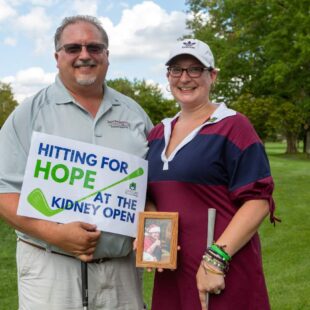Exercise and Nutrition Tips for Caregivers
Making your mental and physical health a top priority will allow you to be an even more effective, less stressed caregiver. Luckily you don’t need a high tech gym or fancy eating plan to improve your physical and nutritional health, all you need are a few rules of thumb.
By: Radana Remillard MS, RD, LDN Guest Author – Radana is a Renal Dietician in Philadelphia, PA
As any transplant caregiver will tell you, making time for oneself is low on the priority list. However just like your flight attendant demonstrates, you have to secure your oxygen mask first before assisting others. The same rings true for caregivers on a day-to-day basis.
1. Eat your colors. Phytochemicals (aka phytonutrients) are substances found in plants that help protect them from environmental damage and diseases and they may do similar things for us. Phytochemicals can repair damaged cells, boost our immune systems and act as antioxidants. These beneficial phytochemicals (there may be thousands of them) also produce bright colors in fruits and vegetables and each performs different functions, therefore, it’s important to eat a variety of them. Some classes of phytochemicals to incorporate into your diet are: Red (lycopene) tomatoes, watermelon, pink grapefruit. Purple/Red (anthocyanins) berries, plums, red grapes, cranberries, pomegranates. Deep Orange (carotenes) carrots, pumpkins, mangoes, apricots, cantaloupe, yams. Yellow-Orange (Vitamin C, flavonoids) citrus fruits, peaches, nectarines, pineapple, papaya. Green (lutein) dark green leafy veggies, green beans, avocados, kiwi, green peppers, honeydew. Cabbage (sulforaphane, etc…) broccoli, Brussels sprouts, cabbage, kale, cauliflower, bok choy. Allium family (onions, garlic, leeks, chives). Look at your plate and determine how many different colors there are. Aim for filling half your plate with brightly colored fruits and vegetables.
2. Follow a basic Mediterranean diet. Research has shown that the traditional Mediterranean diet reduces the risk of heart disease, overall cardiovascular mortality, cancer, and reduces the incidence of Parkinson’s and Alzheimer’s diseases. Key components of the diet are: Getting plenty of exercise, Eating primarily plant-based foods (fruits, vegetables, whole grains, legumes and nuts), replacing butter with healthy fats (olive oil, canola oil), using herbs and spices instead of salt to flavor foods, limiting red meat to no more than a few times a month, eating fish and poultry at least twice a week and drinking red wine in moderation (optional).
3. Move! Aim for at least 30 minutes of physical activity per day. Something as simple as doing sit-ups, push-ups or squats in front of the T.V., taking a brisk walk around the block, hospital or wherever you happen to be, will not only improve your physical health and stamina but can also release endorphins ultimately relaxing you and providing stress relief.
For more information, questions, or concerns e-mail CaregiverLifeline@GiftofLifeFamilyHouse.org







